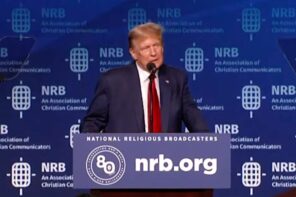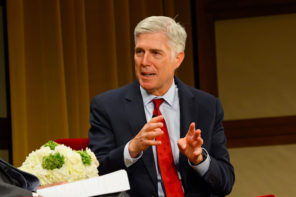As the Scalia-less Supreme Court gets ready to hear the latest challenge to the contraceptive mandate, almost two years to the day after it heard the historic Hobby Lobby case, you could be forgiven for thinking that the case is all about the Little Sisters of the Poor. The last few weeks have seen an onslaught of opinion pieces seeking to ensure that the good sisters are the public face of the case, a strategy designed to capitalize on goodwill for the order to bolster what is a legally weak case.
In Crux, Archbishop William Lori, head of the U.S. Conference of Catholic Bishops’ religious liberty committee, says the case is largely about requiring nuns to cover “abortion-inducing drugs, contraceptives, and sterilization,” and reminds us that the Little Sisters are really, really, good nuns:
The Little Sisters of the Poor are dedicated to serving the elderly poor in nursing homes across the country. The Little Sisters do this because they are followers of Jesus Christ, who commands his disciples to feed the hungry, clothe the naked, and take care of the sick. The Catholic Church calls these works corporal (or bodily) works of mercy. The Little Sisters take Jesus’ command seriously, and in turn, they provide an important service in this country.
As valuable as the Little Sisters’ mission may be, as the Rev. Barry Lynn, head of Americans United for Separation of Church and State noted during a press briefing by the Coalition for Liberty and Justice, the sisters run what is essentially a national chain of nursing homes and the “vast majority of caregivers in these homes are low-wage women workers for whom the additional cost of contraception is a significant financial burden.”
Lori’s piece was followed by a New York Times op-ed purportedly written by Constance Veit, the Little Sisters’ director of vocations, but which sounded an awful lot like the briefs filed by the Becket Fund for Religious Liberty on behalf of the order.
The op-ed argues that requiring the sisters to notify the Department of Health and Human Services that it intends to opt-out of the contraceptive mandate, as allowed under the so-called accommodation provided by the Obama administration, is actually a “permission slip where we authorize the use of our religious health plan to offer services that violate our beliefs and waive our protections under federal civil rights laws. That’s why they need our signature.”
While Veit claims to be merely cleaning up “misinformation” about the case, she fails to mention that the administration has already told the Little Sisters and other plaintiffs that they don’t have to sign the so-called permission slip—they can simply send a letter to HHS stating their intent to opt out.
Even constitutional scholars with a conservative take on religious liberty are calling the contention that the accommodation makes faith-based providers somehow “complicit” in the mandate a massive overreach. In the Washington Post, Douglas Laycock of the University of Virginia argues that finding for the Little Sisters and their co-plaintiffs would “endanger religious liberty” because it would give religious objectors carte blanche to determine “what is a substantial burden on their exercise of religion; the courts must take their word for it.”
Veit then goes on to make the rather bizarre analogy that not providing birth control to employees is like “high schools that have removed soda machines from their property because they don’t think soda is good for children.” According to Veit, the “school simply doesn’t want to be responsible for providing something it believes is bad for its students. It is the same with us.”
But the Little Sisters aren’t arguing that they don’t want to provide birth control because it’s “bad” for women—in fact, from a health perspective it’s just the opposite—they don’t want to provide it because they believe it is immoral.
And in case you forgot, she also reminds us that the Little Sisters “take the vows to become Little Sisters of the Poor do so out of deep love and religious conviction,” and that they “spend our days caring for, learning from, and serving those whom many in our society would prefer to forget.”
So, apparently, if you want to turn a lot of poor, elderly people out on the street, you have to allow the Little Sisters to refuse to let their insurer provide contraceptives to their employees.
The effort to make the Little Sisters the public face of the case has been so extensive, in fact, that you could be forgiven if you didn’t know that the actual name of the case that the Supreme Court is hearing Wednesday is Zubik v. Burwell, which is a consolidated case that includes the Little Sisters’ challenge to the mandate as well as the challenges of six other plaintiffs, including the anti-abortion group Priests for Life and two Catholic dioceses.
And who is this Zubik that the opponents of the mandate are so eager to hide behind the habits of the Little Sisters? He is Bishop David Zubik of Pittsburgh, whose diocese is challenging the accomondation. Apparently the Becket Fund isn’t too eager to remind anyone that it’s actually a bunch of old men who belong to one of the world’s most patriarchal institutions who want to deny women birth control. Wonder why?





